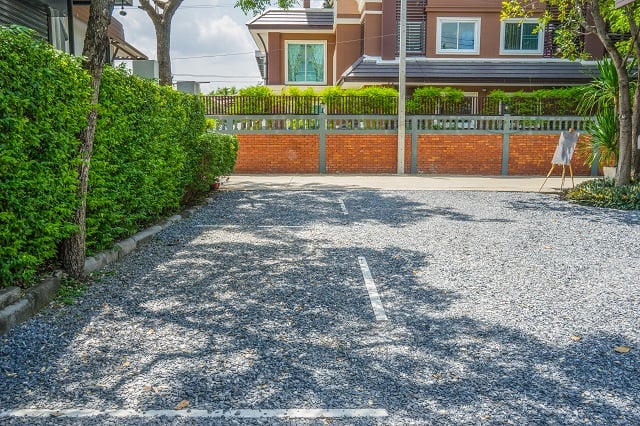There are seven types of gravel and stones you can use to pave a driveway. Based on appearance, longevity, and purpose, we identified Jersey Shore gravel and pea gravel as the best types of gravel for driveways. Marble chips, quarry process, and river rock are some of the best rocks for driveways, and crushed stone #3 and item #4 as the best stones for driveways.
On This Page:
- Best Materials for Loose Driveways
- Best Gravel for Driveway
- Best Rock for Driveway
- Best Stone for Driveway
Best Materials for Loose Driveways
| Material | Best for |
|---|---|
| Crushed stone #3 | Sub-base layer, good drainage |
| Item #4 | Base layer, affordable |
| Jersey Shore gravel | Surfacing, appearance |
| Marble chips | Surfacing, appearance |
| Pea gravel | Surfacing, drainage |
| Quarry process | Base layer, durable |
| River rock | Edging, durable |
Gravel or stone driveways are constructed by building up a number of coatings. They typically have three layers of differently sized rocks: a sub-base layer, a base layer, and a surfacing layer. Depending on the type of stone that is used for surfacing, it may be necessary to edge the drive with another material to keep the surfacing in place. Once you have decided on the best type of gravel for your driveway, contact gravel driveway installation contractors near you to proceed with your project. If you are looking to do maintenance on an existing gravel driveway, identify local gravel driveway repair services.
Best Gravel for Driveway
Gravels are classified by the exact size of the rocks they contain, but in general are a collection of loose, small, fine rocks. They come in a variety of textures, contents, and colors, so you are sure to find one that goes with your front yard landscaping or home exterior. Research the price of installing a gravel driveway when contemplating the details of your driveway project. Gravels work great as the top layer of a driveway, as they form a smooth driving surface. Keep in mind that due to their fine consistency, gravels typically require an edging material to keep them in place.
Jersey Shore Gravel
Jersey Shore gravel contains mostly rounded rocks in shades of brown, white, and yellow. Reminiscent of the beach, this gravel is popular on the eastern seaboard. Since its pebbles are rounded, they do not compact well and instead easily move under vehicles, so this type of surfacing substance needs edging around it.
Pea Gravel
Similar to Jersey Shore gravel, pea gravel is made of naturally weathered, rounded stones, shifts readily, and necessitates the use of a bordering material to stay in place. However, pea gravel comes in a wider array of colors – indeed, both single colors and multicolored mixes are available for purchase. Though it differs by region, the cost of pea gravel is generally relatively low.
Ready to start your Gravel Driveway?
Find ProsBest Rock for Driveway
Rock used on driveways can take the form of whole or crushed rocks. Dependent upon the exact type and size chosen, rock might be the base layer or the surfacing layer of a driveway. Some rocks also work well as an edging surface. When installing a driveway made of rock, remember that materials and labor are just two of the costs you must consider. Another purchase to factor into your plan is that of rock and sand delivery services near you.
Quarry Process
Quarry process is a mixture of pulverized rocks and dust. Once poured, the dust settles into the cracks between rocks, forming a compacted surface. The semi-solid nature of this material means that it does not drain well. Quarry process does, however, make for a good base layer of a driveway.
River Rock
The semi-polished stones of a river rock aggregate are too smooth for surfacing a driveway, although they do serve as an attractive bordering substance. As their name might suggest, river rocks are dredged from the bottoms of rivers and streams; these rocks were naturally polished by the water than ran over them. River rock prices are relatively high when compared to that of other kinds of rock.
Marble Chips
Usually white or gray in color, marble chips are an interesting choice for a surfacing material. Their color reflects sunlight, which deflects heat. Marble chips are quite expensive, though, and when used for surfacing, they require some sort of edging to stay in place.
Best Stone for Driveway
Like gravel, crushed stone comes in a number of grades based on their size. However, crushed stone is, by definition, made by mechanically pulverizing rocks, while gravel is created by natural weathering processes. Crushed stone mixtures might consist of one or a variety of hard rocks, including gneiss, granite, limestone, quartzite, or trap rock. Prices of crushed rock have a correspondingly wide range, but for a ballpark estimate, research the cost of crushed granite in your area.
Crushed Stone #3
Crushed stone #3 includes rocks up to 2 inches in diameter. This aggregate is most suitable for use as a sub-base layer. Crushed stone #3 provides a strong foundation that finer gravel can then be laid upon. Its irregularly shaped rocks will not compact, leaving adequate spaces between rocks to allow for good drainage.
Item #4
While it might sound like a game show prize, Item #4 works well for the bottom layers of your driveway. It’s a combination of dirt, sand, and pulverized stone and available in different compositions and colors. All are quite apt for a base layer or a sub-base layer.

 Concrete Resurfacing – Process & Options
Concrete Resurfacing – Process & Options  How to Protect Your Driveway
How to Protect Your Driveway  Asphalt Paving
Asphalt Paving  Stone and Gravel Driveways
Stone and Gravel Driveways  Green Driveways, Patios, Walkways, & Floors
Green Driveways, Patios, Walkways, & Floors 

Are You Familiar With This Topic? Share Your Experience.